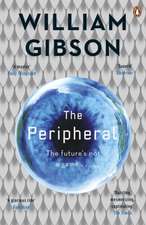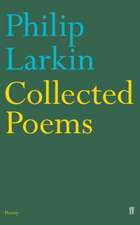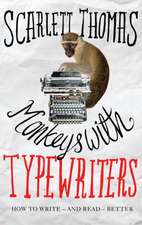Pattern Recognition: Berkley Books
Autor William Gibsonen Limba Engleză Paperback – 31 ian 2005 – vârsta de la 18 ani
Vezi toate premiile Carte premiată
Green Mountain Book Award (2006)
The accolades and acclaim are endless for William Gibson's coast-to-coast bestseller. Set in the post-9/11 present, Pattern Recognition is the story of one woman's never-ending search for the now.
| Toate formatele și edițiile | Preț | Express |
|---|---|---|
| Paperback (3) | 54.09 lei 23-34 zile | +20.63 lei 7-13 zile |
| Penguin Books – 27 iul 2011 | 54.09 lei 23-34 zile | +20.63 lei 7-13 zile |
| Penguin Books – 31 ian 2005 | 63.83 lei 17-23 zile | +5.53 lei 7-13 zile |
| Berkley Books – 31 ian 2004 | 98.37 lei 3-5 săpt. |
Din seria Berkley Books
-
 Preț: 46.62 lei
Preț: 46.62 lei -
 Preț: 66.94 lei
Preț: 66.94 lei -
 Preț: 65.13 lei
Preț: 65.13 lei -
 Preț: 55.61 lei
Preț: 55.61 lei -
 Preț: 97.72 lei
Preț: 97.72 lei -
 Preț: 45.74 lei
Preț: 45.74 lei -
 Preț: 131.94 lei
Preț: 131.94 lei -
 Preț: 112.20 lei
Preț: 112.20 lei -
 Preț: 46.62 lei
Preț: 46.62 lei -
 Preț: 63.33 lei
Preț: 63.33 lei -
 Preț: 57.78 lei
Preț: 57.78 lei -
 Preț: 96.09 lei
Preț: 96.09 lei -
 Preț: 110.32 lei
Preț: 110.32 lei -
 Preț: 99.60 lei
Preț: 99.60 lei -
 Preț: 55.61 lei
Preț: 55.61 lei -
 Preț: 55.85 lei
Preț: 55.85 lei -
 Preț: 127.82 lei
Preț: 127.82 lei -
 Preț: 55.61 lei
Preț: 55.61 lei -
 Preț: 49.88 lei
Preț: 49.88 lei -
 Preț: 59.98 lei
Preț: 59.98 lei -
 Preț: 56.07 lei
Preț: 56.07 lei -
 Preț: 118.73 lei
Preț: 118.73 lei -
 Preț: 99.83 lei
Preț: 99.83 lei -
 Preț: 122.64 lei
Preț: 122.64 lei -
 Preț: 136.89 lei
Preț: 136.89 lei -
 Preț: 71.73 lei
Preț: 71.73 lei -
 Preț: 127.04 lei
Preț: 127.04 lei -
 Preț: 51.10 lei
Preț: 51.10 lei -
 Preț: 283.13 lei
Preț: 283.13 lei -
 Preț: 62.10 lei
Preț: 62.10 lei -
 Preț: 62.23 lei
Preț: 62.23 lei -
 Preț: 80.38 lei
Preț: 80.38 lei -
 Preț: 125.77 lei
Preț: 125.77 lei -
 Preț: 124.72 lei
Preț: 124.72 lei -
 Preț: 104.63 lei
Preț: 104.63 lei -
 Preț: 45.95 lei
Preț: 45.95 lei -
 Preț: 57.78 lei
Preț: 57.78 lei -
 Preț: 122.64 lei
Preț: 122.64 lei -
 Preț: 60.87 lei
Preț: 60.87 lei -
 Preț: 55.61 lei
Preț: 55.61 lei -
 Preț: 103.97 lei
Preț: 103.97 lei -
 Preț: 61.23 lei
Preț: 61.23 lei -
 Preț: 96.35 lei
Preț: 96.35 lei -
 Preț: 68.02 lei
Preț: 68.02 lei -
 Preț: 125.77 lei
Preț: 125.77 lei -
 Preț: 83.02 lei
Preț: 83.02 lei -
 Preț: 62.45 lei
Preț: 62.45 lei -
 Preț: 105.08 lei
Preț: 105.08 lei -
 Preț: 57.71 lei
Preț: 57.71 lei -
 Preț: 137.12 lei
Preț: 137.12 lei
Preț: 63.83 lei
Nou
Puncte Express: 96
Preț estimativ în valută:
12.21€ • 12.62$ • 10.16£
12.21€ • 12.62$ • 10.16£
Carte disponibilă
Livrare economică 22-28 februarie
Livrare express 12-18 februarie pentru 15.52 lei
Preluare comenzi: 021 569.72.76
Specificații
ISBN-13: 9780425198681
ISBN-10: 0425198685
Pagini: 384
Dimensiuni: 109 x 173 x 30 mm
Greutate: 0.2 kg
Editura: Penguin Books
Colecția Berkley Books
Seria Berkley Books
ISBN-10: 0425198685
Pagini: 384
Dimensiuni: 109 x 173 x 30 mm
Greutate: 0.2 kg
Editura: Penguin Books
Colecția Berkley Books
Seria Berkley Books
Recenzii
"A masterful performance." —Chicago Tribune
"One of the first authentic and vital novels of the 21st century." —Washington Post Book World
"Gibson nails the texture of Internet culture." —New YorkTiimes
"Completely contemporary...his best book."— San FranciscoChronicle Book Review
"[An] eerie vision of our time."—New Yorker
"One of the first authentic and vital novels of the 21st century." —Washington Post Book World
"Gibson nails the texture of Internet culture." —New YorkTiimes
"Completely contemporary...his best book."— San FranciscoChronicle Book Review
"[An] eerie vision of our time."—New Yorker
Extras
THE WEBSITE OF DREADFUL NIGHT
Five hours' New York jet lag and Cayce Pollard wakes in Camden Town to the dire and ever-circling wolves of disrupted circadian rhythm.
It is that flat and spectral non-hour, awash in limbic tides, brainstem stirring fitfully, flashing inappropriate reptilian demands for sex, food, sedation, all of the above, and none really an option now.
Not even food, as Damien's new kitchen is as devoid of edible content as its designers' display windows in Camden High Street. Very handsome, the upper cabinets faced in canary-yellow laminate, the lower with lacquered, unstained apple-ply. Very clean and almost entirely empty, save for a carton containing two dry pucks of Weetabix and some loose packets of herbal tea. Nothing at all in the German fridge, so new that its interior smells only of cold and long-chain monomers.
She knows, now, absolutely, hearing the white noise that is London, that Damien's theory of jet lag is correct: that her mortal soul is leagues behind her, being reeled in on some ghostly umbilical down the vanished wake of the plane that brought her here, hundreds of thousands of feet above the Atlantic. Souls can't move that quickly, and are left behind, and must be awaited, upon arrival, like lost luggage.
She wonders if this gets gradually worse with age: the nameless hour deeper, more null, its affect at once stranger and less interesting?
Numb here in the semi-dark, in Damien's bedroom, beneath a silvery thing the color of oven mitts, probably never intended by its makers to actually be slept under. She'd been too tired to find a blanket. The sheets between her skin and the weight of this industrial coverlet are silky, some luxurious thread count, and they smell faintly of, she guesses, Damien. Not badly, though. Actually it's not unpleasant; any physical linkage to a fellow mammal seems a plus at this point.
Damien is a friend.
Their boy-girl Lego doesn't click, he would say.
Damien is thirty, Cayce two years older, but there is some carefully insulated module of immaturity in him, some shy and stubborn thing that frightened the money people. Both have been very good at what they've done, neither seeming to have the least idea of why.
Google Damien and you will find a director of music videos and commercials. Google Cayce and you will find "coolhunter," and if you look closely you may see it suggested that she is a "sensitive" of some kind, a dowser in the world of global marketing.
Though the truth, Damien would say, is closer to allergy, a morbid and sometimes violent reactivity to the semiotics of the marketplace.
Damien's in Russia now, avoiding renovation and claiming to be shooting a documentary. Whatever faintly lived-in feel the place now has, Cayce knows, is the work of a production assistant.
She rolls over, abandoning this pointless parody of sleep. Gropes for her clothes. A small boy's black Fruit Of The Loom T-shirt, thoroughly shrunken, a thin gray V-necked pullover purchased by the half-dozen from a supplier to New England prep schools, and a new and oversized pair of black 501's, every trademark carefully removed. Even the buttons on these have been ground flat, featureless, by a puzzled Korean locksmith, in the Village, a week ago.
The switch on Damien's Italian floor lamp feels alien: a different click, designed to hold back a different voltage, foreign British electricity.
Standing now, stepping into her jeans, she straightens, shivering.
Mirror-world. The plugs on appliances are huge, triple-pronged, for a species of current that only powers electric chairs, in America. Cars are reversed, left to right, inside; telephone handsets have a different weight, a different balance; the covers of paperbacks look like Australian money.
Pupils contracted painfully against sun-bright halogen, she squints into an actual mirror, canted against a gray wall, awaiting hanging, wherein she sees a black-legged, disjointed puppet, sleep-hair poking up like a toilet brush. She grimaces at it, thinking for some reason of a boyfriend who'd insisted on comparing her to Helmut Newton's nude portrait of Jane Birkin.
In the kitchen she runs tap water through a German filter, into an Italian electric kettle. Fiddles with switches, one on the kettle, one on the plug, one on the socket. Blankly surveys the canary expanse of laminated cabinetry while it boils. Bag of some imported Californian tea substitute in a large white mug. Pouring boiling water.
In the flat's main room, she finds that Damien's faithful Cube is on, but sleeping, the night-light glow of its static switches pulsing gently. Damien's ambivalence toward design showing here: He won't allow decorators through the door unless they basically agree to not do that which they do, yet he holds on to this Mac for the way you can turn it upside down and remove its innards with a magic little aluminum handle. Like the sex of one of the robot girls in his video, now that she thinks of it.
She seats herself in his high-backed workstation chair and clicks the transparent mouse. Stutter of infrared on the pale wood of the long trestle table. The browser comes up. She types Fetish:Footage:Forum, which Damien, determined to avoid contamination, will never bookmark.
The front page opens, familiar as a friend's living room. A frame-grab from #48 serves as backdrop, dim and almost monochrome, no characters in view. This is one of the sequences that generate comparisons with Tarkovsky. She only knows Tarkovsky from stills, really, though she did once fall asleep during a screening of The Stalker, going under on an endless pan, the camera aimed straight down, in close-up, at a puddle on a ruined mosaic floor. But she is not one of those who think that much will be gained by analysis of the maker's imagined influences. The cult of the footage is rife with subcults, claiming every possible influence. Truffaut, Peckinpah . . . The Peckinpah people, among the least likely, are still waiting for the guns to be drawn.
She enters the forum itself now, automatically scanning titles of the posts and names of posters in the newer threads, looking for friends, enemies, news. One thing is clear, though; no new footage has surfaced. Nothing since that beach pan, and she does not subscribe to the theory that it is Cannes in winter. French footageheads have been unable to match it, in spite of countless hours recording pans across approximately similar scenery.
She also sees that her friend Parkaboy is back in Chicago, home from an Amtrak vacation, California, but when she opens his post she sees that he's only saying hello, literally.
She clicks Respond, declares herself CayceP.
Hi Parkaboy. nt
When she returns to the forum page, her post is there.
It is a way now, approximately, of being at home. The forum has become one of the most consistent places in her life, like a familiar café that exists somehow outside of geography and beyond time zones.
There are perhaps twenty regular posters on F:F:F, and some much larger and uncounted number of lurkers. And right now there are three people in Chat, but there's no way of knowing exactly who until you are in there, and the chat room she finds not so comforting. It's strange even with friends, like sitting in a pitch-dark cellar conversing with people at a distance of about fifteen feet. The hectic speed, and the brevity of the lines in the thread, plus the feeling that everyone is talking at once, at counter-purposes, deter her.
The Cube sighs softly and makes subliminal sounds with its drive, like a vintage sports car downshifting on a distant freeway. She tries a sip of tea substitute, but it's still too hot. A gray and indeterminate light is starting to suffuse the room in which she sits, revealing such Damieniana as has survived the recent remake.
Partially disassembled robots are propped against one wall, two of them, torsos and heads, like elfin, decidedly female crash-test dummies. These are effects units from one of Damien's videos, and she wonders, given her mood, why she finds them so comforting. Probably because they are genuinely beautiful, she decides. Optimistic expressions of the feminine. No sci-fi kitsch for Damien. Dreamlike things in the dawn half-light, their small breasts gleaming, white plastic shining faint as old marble. Personally fetishistic, though; she knows he'd had them molded from a body cast of his last girlfriend, minus two.
Hotmail downloads four messages, none of which she feels like opening. Her mother, three spam. The penis enlarger is still after her, twice, and Increase Your Breast Size Dramatically.
Deletes spam. Sips the tea substitute. Watches the gray light becoming more like day.
Eventually she goes into Damien's newly renovated bathroom. Feels she could shower down in it prior to visiting a sterile NASA probe, or step out of some Chernobyl scenario to have her lead suit removed by rubber-gowned Soviet technicians, who'd then scrub her with long-handled brushes. The fixtures in the shower can be adjusted with elbows, preserving the sterility of scrubbed hands.
She pulls off her sweater and T-shirt and, using hands, not elbows, starts the shower and adjusts the temperature.
FOUR hours later she's on a reformer in a Pilates studio in an upscale alley called Neal's Yard, the car and driver from Blue Ant waiting out on whatever street it is. The reformer is a very long, very low, vaguely ominous and Weimar-looking piece of spring-loaded furniture. On which she now reclines, doing v-position against the foot rail at the end. The padded platform she rests on wheels back and forth along tracks of angle-iron within the frame, springs twanging softly. Ten of these, ten toes, ten from the heels. . . In New York she does this at a fitness center frequented by dance professionals, but here in Neal's Yard, this morning, she seems to be the sole client. The place is only recently opened, apparently, and perhaps this sort of thing is not yet so popular here. There is that mirror-world ingestion of archaic substances, she thinks: People smoke, and drink as though it were good for you, and seem to still be in some sort of honeymoon phase with cocaine. Heroin, she's read, is cheaper here than it's ever been, the market still glutted by the initial dumping of Afghani opium supplies.
Done with her toes, she changes to heels, craning her neck to be certain her feet are correctly aligned. She likes Pilates because it isn't, in the way she thinks of yoga, meditative. You have to keep your eyes open, here, and pay attention.
That concentration counters the anxiety she feels now, the pre-job jitters she hasn't experienced in a while.
She's here on Blue Ant's ticket. Relatively tiny in terms of permanent staff, globally distributed, more post-geographic than multinational, the agency has from the beginning billed itself as a high-speed, low-drag life-form in an advertising ecology of lumbering herbivores. Or perhaps as some non-carbon-based life-form, entirely sprung from the smooth and ironic brow of its founder, Hubertus Bigend, a nominal Belgian who looks like Tom Cruise on a diet of virgins' blood and truffled chocolates.
The only thing Cayce enjoys about Bigend is that he seems to have no sense at all that his name might seem ridiculous to anyone, ever. Otherwise, she would find him even more unbearable than she already does.
It's entirely personal, though at one remove.
Still doing heels, she checks her watch, a Korean clone of an old-school Casio G-Shock, its plastic case sanded free of logos with a scrap of Japanese micro-abrasive. She is due in Blue Ant's Soho offices in fifty minutes.
She drapes a pair of limp green foam pads over the foot rail, carefully positions her feet, lifts them on invisible stiletto heels, and begins her ten prehensile.
—Reprinted from Pattern Recognition by William Gibson by permission of G. P. Putnam’s Sons, a member of Penguin Putnam Inc. Copyright © 2003, William Gibson. All rights reserved. This excerpt, or any parts thereof, may not be reproduced in any form without permission.
Five hours' New York jet lag and Cayce Pollard wakes in Camden Town to the dire and ever-circling wolves of disrupted circadian rhythm.
It is that flat and spectral non-hour, awash in limbic tides, brainstem stirring fitfully, flashing inappropriate reptilian demands for sex, food, sedation, all of the above, and none really an option now.
Not even food, as Damien's new kitchen is as devoid of edible content as its designers' display windows in Camden High Street. Very handsome, the upper cabinets faced in canary-yellow laminate, the lower with lacquered, unstained apple-ply. Very clean and almost entirely empty, save for a carton containing two dry pucks of Weetabix and some loose packets of herbal tea. Nothing at all in the German fridge, so new that its interior smells only of cold and long-chain monomers.
She knows, now, absolutely, hearing the white noise that is London, that Damien's theory of jet lag is correct: that her mortal soul is leagues behind her, being reeled in on some ghostly umbilical down the vanished wake of the plane that brought her here, hundreds of thousands of feet above the Atlantic. Souls can't move that quickly, and are left behind, and must be awaited, upon arrival, like lost luggage.
She wonders if this gets gradually worse with age: the nameless hour deeper, more null, its affect at once stranger and less interesting?
Numb here in the semi-dark, in Damien's bedroom, beneath a silvery thing the color of oven mitts, probably never intended by its makers to actually be slept under. She'd been too tired to find a blanket. The sheets between her skin and the weight of this industrial coverlet are silky, some luxurious thread count, and they smell faintly of, she guesses, Damien. Not badly, though. Actually it's not unpleasant; any physical linkage to a fellow mammal seems a plus at this point.
Damien is a friend.
Their boy-girl Lego doesn't click, he would say.
Damien is thirty, Cayce two years older, but there is some carefully insulated module of immaturity in him, some shy and stubborn thing that frightened the money people. Both have been very good at what they've done, neither seeming to have the least idea of why.
Google Damien and you will find a director of music videos and commercials. Google Cayce and you will find "coolhunter," and if you look closely you may see it suggested that she is a "sensitive" of some kind, a dowser in the world of global marketing.
Though the truth, Damien would say, is closer to allergy, a morbid and sometimes violent reactivity to the semiotics of the marketplace.
Damien's in Russia now, avoiding renovation and claiming to be shooting a documentary. Whatever faintly lived-in feel the place now has, Cayce knows, is the work of a production assistant.
She rolls over, abandoning this pointless parody of sleep. Gropes for her clothes. A small boy's black Fruit Of The Loom T-shirt, thoroughly shrunken, a thin gray V-necked pullover purchased by the half-dozen from a supplier to New England prep schools, and a new and oversized pair of black 501's, every trademark carefully removed. Even the buttons on these have been ground flat, featureless, by a puzzled Korean locksmith, in the Village, a week ago.
The switch on Damien's Italian floor lamp feels alien: a different click, designed to hold back a different voltage, foreign British electricity.
Standing now, stepping into her jeans, she straightens, shivering.
Mirror-world. The plugs on appliances are huge, triple-pronged, for a species of current that only powers electric chairs, in America. Cars are reversed, left to right, inside; telephone handsets have a different weight, a different balance; the covers of paperbacks look like Australian money.
Pupils contracted painfully against sun-bright halogen, she squints into an actual mirror, canted against a gray wall, awaiting hanging, wherein she sees a black-legged, disjointed puppet, sleep-hair poking up like a toilet brush. She grimaces at it, thinking for some reason of a boyfriend who'd insisted on comparing her to Helmut Newton's nude portrait of Jane Birkin.
In the kitchen she runs tap water through a German filter, into an Italian electric kettle. Fiddles with switches, one on the kettle, one on the plug, one on the socket. Blankly surveys the canary expanse of laminated cabinetry while it boils. Bag of some imported Californian tea substitute in a large white mug. Pouring boiling water.
In the flat's main room, she finds that Damien's faithful Cube is on, but sleeping, the night-light glow of its static switches pulsing gently. Damien's ambivalence toward design showing here: He won't allow decorators through the door unless they basically agree to not do that which they do, yet he holds on to this Mac for the way you can turn it upside down and remove its innards with a magic little aluminum handle. Like the sex of one of the robot girls in his video, now that she thinks of it.
She seats herself in his high-backed workstation chair and clicks the transparent mouse. Stutter of infrared on the pale wood of the long trestle table. The browser comes up. She types Fetish:Footage:Forum, which Damien, determined to avoid contamination, will never bookmark.
The front page opens, familiar as a friend's living room. A frame-grab from #48 serves as backdrop, dim and almost monochrome, no characters in view. This is one of the sequences that generate comparisons with Tarkovsky. She only knows Tarkovsky from stills, really, though she did once fall asleep during a screening of The Stalker, going under on an endless pan, the camera aimed straight down, in close-up, at a puddle on a ruined mosaic floor. But she is not one of those who think that much will be gained by analysis of the maker's imagined influences. The cult of the footage is rife with subcults, claiming every possible influence. Truffaut, Peckinpah . . . The Peckinpah people, among the least likely, are still waiting for the guns to be drawn.
She enters the forum itself now, automatically scanning titles of the posts and names of posters in the newer threads, looking for friends, enemies, news. One thing is clear, though; no new footage has surfaced. Nothing since that beach pan, and she does not subscribe to the theory that it is Cannes in winter. French footageheads have been unable to match it, in spite of countless hours recording pans across approximately similar scenery.
She also sees that her friend Parkaboy is back in Chicago, home from an Amtrak vacation, California, but when she opens his post she sees that he's only saying hello, literally.
She clicks Respond, declares herself CayceP.
Hi Parkaboy. nt
When she returns to the forum page, her post is there.
It is a way now, approximately, of being at home. The forum has become one of the most consistent places in her life, like a familiar café that exists somehow outside of geography and beyond time zones.
There are perhaps twenty regular posters on F:F:F, and some much larger and uncounted number of lurkers. And right now there are three people in Chat, but there's no way of knowing exactly who until you are in there, and the chat room she finds not so comforting. It's strange even with friends, like sitting in a pitch-dark cellar conversing with people at a distance of about fifteen feet. The hectic speed, and the brevity of the lines in the thread, plus the feeling that everyone is talking at once, at counter-purposes, deter her.
The Cube sighs softly and makes subliminal sounds with its drive, like a vintage sports car downshifting on a distant freeway. She tries a sip of tea substitute, but it's still too hot. A gray and indeterminate light is starting to suffuse the room in which she sits, revealing such Damieniana as has survived the recent remake.
Partially disassembled robots are propped against one wall, two of them, torsos and heads, like elfin, decidedly female crash-test dummies. These are effects units from one of Damien's videos, and she wonders, given her mood, why she finds them so comforting. Probably because they are genuinely beautiful, she decides. Optimistic expressions of the feminine. No sci-fi kitsch for Damien. Dreamlike things in the dawn half-light, their small breasts gleaming, white plastic shining faint as old marble. Personally fetishistic, though; she knows he'd had them molded from a body cast of his last girlfriend, minus two.
Hotmail downloads four messages, none of which she feels like opening. Her mother, three spam. The penis enlarger is still after her, twice, and Increase Your Breast Size Dramatically.
Deletes spam. Sips the tea substitute. Watches the gray light becoming more like day.
Eventually she goes into Damien's newly renovated bathroom. Feels she could shower down in it prior to visiting a sterile NASA probe, or step out of some Chernobyl scenario to have her lead suit removed by rubber-gowned Soviet technicians, who'd then scrub her with long-handled brushes. The fixtures in the shower can be adjusted with elbows, preserving the sterility of scrubbed hands.
She pulls off her sweater and T-shirt and, using hands, not elbows, starts the shower and adjusts the temperature.
FOUR hours later she's on a reformer in a Pilates studio in an upscale alley called Neal's Yard, the car and driver from Blue Ant waiting out on whatever street it is. The reformer is a very long, very low, vaguely ominous and Weimar-looking piece of spring-loaded furniture. On which she now reclines, doing v-position against the foot rail at the end. The padded platform she rests on wheels back and forth along tracks of angle-iron within the frame, springs twanging softly. Ten of these, ten toes, ten from the heels. . . In New York she does this at a fitness center frequented by dance professionals, but here in Neal's Yard, this morning, she seems to be the sole client. The place is only recently opened, apparently, and perhaps this sort of thing is not yet so popular here. There is that mirror-world ingestion of archaic substances, she thinks: People smoke, and drink as though it were good for you, and seem to still be in some sort of honeymoon phase with cocaine. Heroin, she's read, is cheaper here than it's ever been, the market still glutted by the initial dumping of Afghani opium supplies.
Done with her toes, she changes to heels, craning her neck to be certain her feet are correctly aligned. She likes Pilates because it isn't, in the way she thinks of yoga, meditative. You have to keep your eyes open, here, and pay attention.
That concentration counters the anxiety she feels now, the pre-job jitters she hasn't experienced in a while.
She's here on Blue Ant's ticket. Relatively tiny in terms of permanent staff, globally distributed, more post-geographic than multinational, the agency has from the beginning billed itself as a high-speed, low-drag life-form in an advertising ecology of lumbering herbivores. Or perhaps as some non-carbon-based life-form, entirely sprung from the smooth and ironic brow of its founder, Hubertus Bigend, a nominal Belgian who looks like Tom Cruise on a diet of virgins' blood and truffled chocolates.
The only thing Cayce enjoys about Bigend is that he seems to have no sense at all that his name might seem ridiculous to anyone, ever. Otherwise, she would find him even more unbearable than she already does.
It's entirely personal, though at one remove.
Still doing heels, she checks her watch, a Korean clone of an old-school Casio G-Shock, its plastic case sanded free of logos with a scrap of Japanese micro-abrasive. She is due in Blue Ant's Soho offices in fifty minutes.
She drapes a pair of limp green foam pads over the foot rail, carefully positions her feet, lifts them on invisible stiletto heels, and begins her ten prehensile.
—Reprinted from Pattern Recognition by William Gibson by permission of G. P. Putnam’s Sons, a member of Penguin Putnam Inc. Copyright © 2003, William Gibson. All rights reserved. This excerpt, or any parts thereof, may not be reproduced in any form without permission.
Descriere
Gibson's highly acclaimed "New York Times" bestselling novel is the story of a trend predictor in London who's offered a job to find the creator of the obscure, enigmatic video clips being uploaded to the Internet--footage that is generating massive underground buzz worldwide.
Notă biografică
William Gibson
Premii
- Green Mountain Book Award Nominee, 2006
























